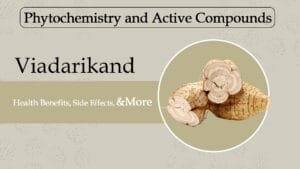Vidarikand, scientifically known as Pueraria tuberosa, is a perennial herb that belongs to the legume family and is primarily found in the tropical and subtropical regions of India, Southeast Asia, and parts of Africa. It is widely used in traditional Indian medicine, especially Ayurveda, for its numerous therapeutic properties, which include enhancing energy, improving digestive function, and supporting reproductive health. The herb’s root is the most potent part, valued for its wide range of health benefits. In this article, we will delve into the various aspects of Vidarikand’s medicinal properties, its traditional uses, and its applications in modern wellness.
Thank you for reading this post, don't forget to subscribe!Botanical Characteristics
Vidarikand is a climbing plant with long, slender stems, and its roots are typically tuberous and fleshy, reaching a considerable length. The plant thrives in warm climates with rich, loamy soil and is often found in forests, grasslands, and along roadsides in tropical and subtropical regions. The plant produces purple or violet-colored flowers, which further add to its natural beauty. However, it is the root of Pueraria tuberosa that holds the greatest significance in the world of herbal medicine due to its rich concentration of bioactive compounds.
Phytochemistry and Active Compounds

The root of Vidarikand contains several bioactive compounds, including flavonoids, isoflavones, saponins, alkaloids, and tannins. One of the most notable active compounds in Vidarikand is puerarin, an isoflavonoid glycoside that is believed to have antioxidant, anti-inflammatory, and neuroprotective effects. Other compounds like daidzein and genistein, both of which belong to the class of phytoestrogens, are also present in the plant and are believed to contribute to its hormonal balancing and reproductive health benefits.
These active compounds work synergistically to offer a wide range of therapeutic effects that make Vidarikand a valuable addition to natural health practices. Let us now look at the primary health benefits of this remarkable herb.
1. Energy and Vitality Enhancement
One of the most well-known benefits of Vidarikand is its ability to enhance vitality and promote overall energy levels. In Ayurveda, it is regarded as a potent “Rasayana” or rejuvenating herb that can help restore energy, strength, and endurance. It is particularly beneficial for individuals who experience chronic fatigue, general weakness, or those recovering from illness or excessive physical exertion.
As an adaptogen, Vidarikand helps the body adapt to stress and environmental changes, supporting the adrenal glands in the process. This makes it an excellent choice for combating fatigue and improving stamina. Studies suggest that the herb’s adaptogenic properties help enhance physical performance, which is why it is often recommended for athletes or those who lead physically demanding lifestyles.
2. Support for Reproductive Health

Vidarikand has a significant place in traditional medicine for its ability to support reproductive health, particularly in the realms of male and female fertility. In men, it has been used to enhance sperm count and improve overall reproductive health. Research indicates that the herb can improve sperm motility and quality, thereby increasing the chances of conception.
For women, Vidarikand is known to regulate menstrual cycles, reduce menstrual discomfort, and improve hormonal balance. It is considered beneficial for women dealing with issues like polycystic ovary syndrome (PCOS) and endometriosis, as it may help manage symptoms related to hormonal imbalance. Additionally, the herb’s phytoestrogenic properties make it valuable for alleviating menopausal symptoms such as hot flashes, mood swings, and irritability.
3. Digestive Health and Detoxification
The digestive benefits of Vidarikand are also noteworthy. It has long been used as a natural remedy for improving digestive health by promoting better nutrient absorption, relieving bloating, and alleviating symptoms of indigestion. The herb’s ability to support gastrointestinal function stems from its calming effects on the gut and its ability to stimulate digestive juices, improving the breakdown and absorption of nutrients from food.
Moreover, Vidarikand has detoxifying properties that can help cleanse the digestive system and remove accumulated toxins. Its high fiber content further supports healthy bowel movements and may assist in preventing constipation. The herb is frequently used in Ayurvedic formulations aimed at improving gut health, managing irritable bowel syndrome (IBS), and treating other digestive disorders.
4. Anti-inflammatory and Antioxidant Properties
Vidarikand is known for its potent anti-inflammatory and antioxidant properties, which contribute to its role in managing a wide range of inflammatory conditions. The herb’s bioactive compounds, especially puerarin, have been shown to exhibit strong anti-inflammatory effects, which can be beneficial for individuals suffering from chronic pain conditions such as arthritis, rheumatism, and muscle soreness.
The antioxidant properties of Vidarikand help neutralize harmful free radicals in the body, protecting cells from oxidative damage. This is particularly important for reducing the risk of chronic diseases like heart disease, cancer, and neurodegenerative disorders. By reducing oxidative stress, Vidarikand helps promote longevity, supports immune function, and enhances overall well-being.
5. Mental Health and Stress Reduction

In addition to its physical health benefits, Vidarikand also has a positive impact on mental health. The adaptogenic qualities of the herb help balance the body’s stress response, making it a valuable remedy for individuals dealing with anxiety, depression, and stress-related disorders. It helps stabilize mood, reduce anxiety levels, and promote a sense of calm and relaxation.
The herb’s neuroprotective properties are beneficial for enhancing cognitive function and memory. In Ayurvedic medicine, it is often used as a brain tonic to improve mental clarity and support brain health. As such, it can be useful in alleviating symptoms of mental fatigue and improving concentration, focus, and overall mental well-being.
6. Joint and Bone Health
Given its anti-inflammatory properties, Vidarikand is also beneficial for joint and bone health. It is often included in formulations aimed at treating joint pain, stiffness, and inflammation caused by conditions like osteoarthritis and rheumatoid arthritis. The herb’s ability to reduce inflammation in the joints can help alleviate pain, improve mobility, and support overall joint function.
Moreover, Vidarikand may have a positive effect on bone density, potentially reducing the risk of conditions like osteoporosis, especially in postmenopausal women. By supporting the overall health of bones and joints, it promotes better mobility and quality of life for individuals with musculoskeletal disorders.
7. Uses and Consumption Methods
Vidarikand can be consumed in various forms, including as a powder, capsule, tablet, or liquid extract. The dried root of the plant is often powdered and used in herbal formulations, either alone or in combination with other herbs. The powder can be mixed with water, milk, or honey to create a soothing drink that provides multiple health benefits.
In some Ayurvedic practices, the root is boiled to make a decoction, which is consumed daily for vitality and digestive support. Additionally, Vidarikand is sometimes combined with other herbs like Ashwagandha, Shatavari, and Gokshura to enhance its therapeutic effects, particularly in formulations aimed at supporting reproductive health and vitality.
8. Safety and Considerations

While Vidarikand is generally regarded as safe when used in recommended doses, it is important to consult with a healthcare provider before starting any new herbal supplement, especially if you have pre-existing medical conditions or are taking other medications. Pregnant or breastfeeding women should exercise caution, as the herb’s hormonal effects may not be suitable during these stages.
Additionally, individuals with known allergies to legumes or other plants in the legume family should avoid using Vidarikand to prevent allergic reactions.
Conclusion
Vidarikand (Pueraria tuberosa) is a remarkable herb with a broad spectrum of health benefits, ranging from enhanced vitality and reproductive health to improved digestion and joint support. Its rich history in traditional medicine, particularly in Ayurveda, underscores its importance as a powerful and versatile natural remedy. With its antioxidant, anti-inflammatory, and adaptogenic properties, Vidarikand offers a holistic approach to wellness, supporting both physical and mental health. As ongoing research continues to explore its full potential, this herb remains a valuable part of herbal and Ayurvedic medicine, offering a natural solution to many modern health concerns.

